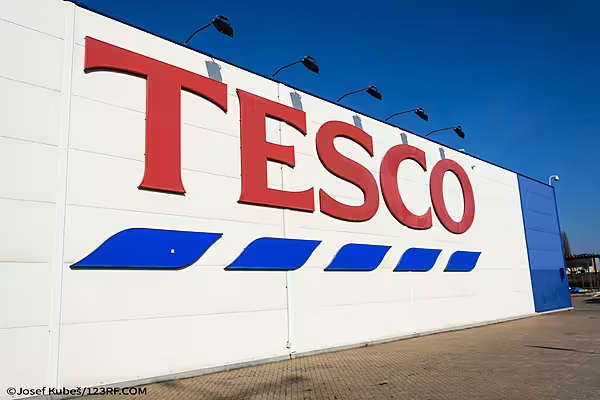Tesco, Britain's biggest retailer has forecasted its full-year profit at the lower end of its previous guidance, blaming uncertainty over how a worsening cost-of-living crisis would affect consumer spending.
Confidence among Britain's shoppers sank to a record low last month as they struggle with soaring inflation - even before the government's new economic plan sent mortgage rates surging and sparked fears of a sharp drop in house prices.
Market Share
Tesco, which has a 27% share of Britain's grocery market, said on Wednesday customers were continuing to change their shopping habits to save money and reduce waste.
"We are seeing more frequent shops, smaller basket sizes and less shopping online," Ken, Murphy, CEO told reporters, adding customers were also buying more own-label goods and frozen foods, which tend to be cheaper than branded or fresh options.
Tesco noted that it now expects a retail adjusted operating profit in its 2022-2023 financial year of £2.4-2.5 billion ($2.7-$2.9 billion).
It had previously forecast £2.4-2.6 billion, down from the £2.65 billion made in 2021-22.
Tesco's Shares
Tesco's shares were down 2% at 0812 GMT, extending 2022 losses to 29%. Nevertheless, most analysts consider it best placed amongst Britain's major supermarket groups to navigate the downturn due to its huge buying power.
Richard Hunter, head of markets at Interactive Investor, pointed to Tesco's cash generation after it upgraded its expectation for full-year retail free cash flow to at least 1.8 billion pounds.
"The group's sheer scale has also enabled price increases to be kept to a relative minimum, while its long-established supplier relationships ease some of the pressure as compared to many of its rivals," he said.
Pay Rise
Tesco reported first-half retail adjusted operating profit of £1.248 billion - down 10% from a pandemic-boosted £1.386 billion last year, and a fraction below analysts' average forecast of £1.251 billion.
First-half group sales rose 3.1% to 28.178 billion pounds, with UK like-for-like sales up 0.7%, having fallen 1.5% in the first quarter.
In April, Tesco and Britain's No. 2 grocer Sainsbury's warned of a hit to profits this year as they plough cash into keeping prices competitive to deter customers from switching to German-owned discounters Aldi and Lidl, and face soaring energy and labour costs.
Tesco is benefiting from the popularity of its 'Clubcard Prices' loyalty programme, a scheme to price-match Aldi on some products, and the unrivalled scale of its stores and online operations.
Monthly industry data has shown Tesco consistently outperforming its biggest rivals, Sainsbury's, Asda and Morrisons, on a sales value basis.
Rivals Performance
Last month, Morrisons, the Co-operative and Aldi UK all reported profit falls, while clothing retailers Next, Primark, ASOS and Boohoo all warned on profit.
Tesco also joined rivals in raising pay for its UK store staff.
The minimum hourly rate will rise 20 pence to £10.30 from 13 November.
Murphy said he still expected UK shoppers to spend this Christmas, despite the gloomy backdrop.
"We think it's going to be a Christmas that people are going to want to celebrate, but clearly they're going to want to celebrate it in an affordable way."
News by Reuters, edited by Donna Ahern, Checkout. For more retail stories, click here. Click subscribe to sign up for the Checkout print edition.





